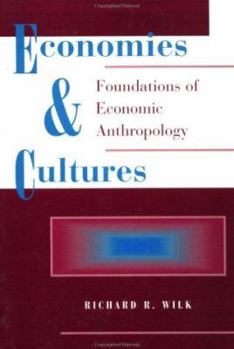Economies and Cultures: Foundations of Economic Anthropology
Select Format
Select Condition 
Book Overview
This synthesis of modern economic anthropology goes to the heart of a thriving subdiscipline and identifies the fundamental practical and theoretical problems that give economic anthropology its... This description may be from another edition of this product.
Format:Paperback
Language:English
ISBN:0813320585
ISBN13:9780813320588
Release Date:October 1996
Publisher:Routledge
Length:208 Pages
Weight:0.60 lbs.
Dimensions:0.6" x 6.2" x 9.2"
Customer Reviews
5 ratings
Excellent introduction to economic anthropology
Published by Thriftbooks.com User , 14 years ago
Wilk and Cliggett have written an excellent introduction to the subdiscipline of economic anthropology. By providing historical context for the debates that have framed the field, they highlight (rather than obscure) how such data has been produced and deployed. I assign this book for my Economic Anthropology class and have found it excellent for class use, although I think it could easily be read outside of a classroom context for an overview of the field.
Eye Opening
Published by Thriftbooks.com User , 15 years ago
An excellent primer on the connection between Anthropology and Economics. I have long since passed it on to my socially aware but economically ignorant friends.
The critical breadth of Harris, the bad faith of Popper
Published by Thriftbooks.com User , 19 years ago
Wilk begins his theoretical survey of economic anthropology with a review of the debate that spurred the birth of the field: the debate between the "substantivists" and the "formalists" during the 1950's, '60's, and early '70's. Wilk contends that, while some of the points made by both factions are valuable and deserve revisiting, each camp in effect argued past the other because of their shared mistaken belief that their respective viewpoints represented conceptually integrated, mutually exclusive wholes. The argument eventually sputtered out rather than came to a definitive conclusion, Wilk says, because this fundamental mistake fed into a series of ever-more-intractably convoluted polemics, but also because other issues (for example the emergence of applied anthropology) caused economic anthropologists to shift their interests toward other pursuits.Wilk then divides the body of economic anthropological literature into three groups according to three major outlooks on human motivation. Unlike the case of the substantivists and the formalists, he maintains, these three are conceptually integrated and mutually exclusive: 1) humans are motivated by self-interest; 2) humans are motivated by an intrinsic sociability; or 3) humans are motivated by deeply ingrained, culturally instilled morals or values. Yet, somewhat paradoxically, Wilk also suggests that each school of thought may share some themes or dimensions in common with the others, and he discusses the work of two anthropologists who have employed all three models in hybridized or eclectic fashion.The dominant undercurrent of Wilk's survey is a deep dissatisfaction with the fractured state of economic anthropological scholarship. The field remains fractured along these party lines, he says, because each takes certain fundamental propositions about human nature on faith rather than testing them. One consequence appears to be that each perspective seems to work out well enough only some of the time, there being copious counterexamples for each (not to mention those cases which might be just as well explained by one perspective as by another). The conflicted and fractured academy will remain so, he says, so long as each perspective's core concepts are held in such high, unimpeachable esteem.I agree with Wilk that many of these allegedly self-evident and ergo unimpeachable presuppositions are in fact quite easily felled by well-known ethnographic data. I also agree that most or all explanation should rely on empirical testing. But I believe that Wilk goes to far in reviving the bad faith of the 19th and 20th century positivists (I find Karl Popper's expression to be the most articulate and historically informed of the positivists . . . a fact which also makes him the most articulate advocate of positivist bad faith, as pointed out by Thomas Kuhn): like the positivists, Wilk seems to insist that the epistemological veracity of every single proposition that we make about anything must lie
One of the few good overviews on economic anthropology
Published by Thriftbooks.com User , 20 years ago
I found this book very useful. Anthropologists' approach to economic topics is clearly stated and contrasted with formal economics approaches (or at least stereotypic economics approaches). I did find it weird that little mention is made in the book of Marcel Mauss, author of _The Gift_ and the super-granddaddy of economic anthropology. 2009 note: the original comment was written before the second edition. In the newer edition, Wilk and Cliggett add a nice section on gift exchange (an important topic in anthropology and a good addition to this book)
Underpinnings of economic anthropology
Published by Thriftbooks.com User , 23 years ago
This book provides a nice discussion of the philosophical and historical underpinnings of economic anthropology. It shows how three perspectives have predominated in economic anthropology: whether people are selfish, moral or self-interested. The book traces the trajectories of each of these stances back in time, making interesting connections. The result is a work that makes one think hard about assumptions and limitations. Less attention is given to detailed discussion of formal economic models. The writing style is accessible, the voice active and the touches of humor (e.g. the drawing that depicts "academic strife") refreshing. This book might deserve a spot next to a favored ethnography or economics textbook on your shelf.





